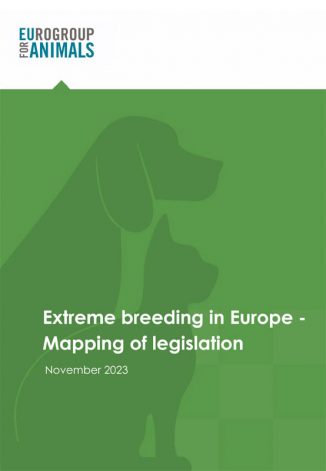
Eurogroup for Animals
MENU
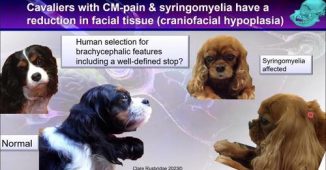 Prof. Clare Rusbridge, leading expert on Chiari-like Malformation (CM) and Syringomyelia (SM) (CM/SM) in Cavaliers, has launched a new YouTube channel for a series of bite sized videos on this painful disease.
Prof. Clare Rusbridge, leading expert on Chiari-like Malformation (CM) and Syringomyelia (SM) (CM/SM) in Cavaliers, has launched a new YouTube channel for a series of bite sized videos on this painful disease.
We have a page containing all the videos, please view it here.
MCADD: Medium-chain Acyl-CoA Dehydrogenase Deficiency
A serious new genetic disorder has been found in the Cavalier King Charles Spaniel. Please see the page about this here.
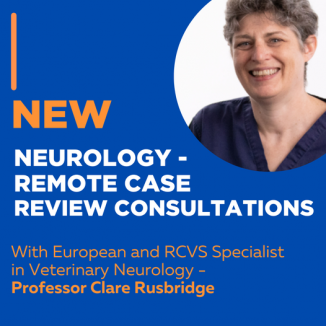 Did you know… wherever you are, UK or worldwide, you can now get advice from neurology specialist Clare Rusbridge?
Did you know… wherever you are, UK or worldwide, you can now get advice from neurology specialist Clare Rusbridge?
WEAR Referrals has introduced a tele-consult service for neurology. This means that regardless of your location, you can always be referred to Clare Rusbridge – the European and RCVS Specialist in Neurology. This service gives owners a useful overview to consider what treatment options are available and whether a full referral is right for their pet – without the stress of travel.
To learn more about the service and arrange a neurology tele-consult, veterinary professionals can use the online referral form here.
Naturewatch Foundation Animal Welfare
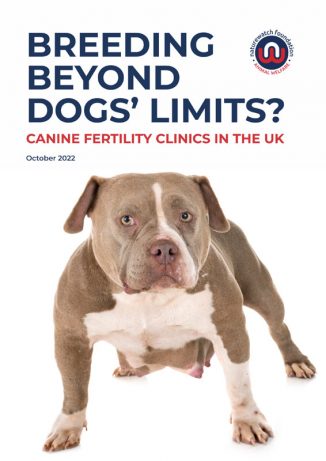
Canine Fertility Clinics are the latest UK dog breeding phenomenon.
The number of businesses selling breeding procedures and related services for people who breed dogs has increased rapidly in recent years. Some of these are entirely unregulated and unaccountable. The Report examines the canine fertility sector in the UK and outlines findings from Naturewatch Foundation’s survey for veterinary professionals. It also suggests a way forward so that we can begin to tackle the challenges posed in this new sector. Its recommendations include: a public statement from the RCVS; a Defra Task Force; strengthened breeding recommendations; reform of the Veterinary Surgeons Act 1966; collaboration between dog welfare organisations on initiatives to improve the welfare of dogs used for breeding and their offspring.
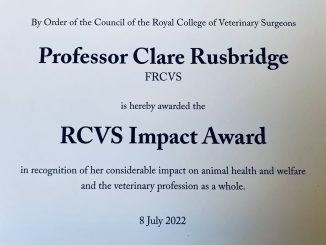 Congratulations to our patron, Professor Clare Rusbridge, who has collected her RCVS Impact Award.
Congratulations to our patron, Professor Clare Rusbridge, who has collected her RCVS Impact Award.
Many thousands of dogs have benefited from Prof. Clare Rusbridge’s Treatment Algorithm preventing pain and suffering.
There are over 27,000 vets and 17,000 registered veterinary nurses in the UK – and only up to 2 RCVS Impact Awards can be bestowed in any year.
The award is bestowed upon a veterinary surgeon or veterinary nurse who has recently, or is currently, undertaking a project, initiative or similar that has a significant impact on the profession at large, animal health or welfare, or public health. Such impact could have been made through any field of veterinary endeavour, including clinical practice, research, education or veterinary politics.
 Cavalier Matters supported Clare’s nomination – we felt it was important to acknowledge Clare’s contribution to the understanding and management of Chiari-like malformation and Syringomyelia [CM/SM].
Cavalier Matters supported Clare’s nomination – we felt it was important to acknowledge Clare’s contribution to the understanding and management of Chiari-like malformation and Syringomyelia [CM/SM].
Clare chose to investigate Chiari-like malformation and Syringomyelia [CM/SM] for her PhD. Sadly this painful condition is very prevalent in Cavalier King Charles Spaniels (and also affects other breeds). Clare provided the first comprehensive description and her work since has enabled further understanding in addition to greatly improving treatment.
Clare helped establish a health scheme for testing for CM/SM [requested by breeders].
Clare created the treatment algorithm, which is now used worldwide; it revolutionised the prescribing of appropriate medications by veterinarians. Thousands of pet owners are sadly unable to afford to consult with a neurologist, so this prevents unnecessary suffering.
The Cavalier Matters charity has over 42,000 followers on social media; the Companion Cavalier Club has over 220 members. Clare donates her precious free time helping with their websites and in particular, information posters about CM/SM to ensure they are distributing correct information.
 Clare also gives presentations at health seminars for Cavalier owners, supplying information on the latest research and answering questions, including how to achieve the best quality of life for their companion and understanding the management of pain relieving medications.
Clare also gives presentations at health seminars for Cavalier owners, supplying information on the latest research and answering questions, including how to achieve the best quality of life for their companion and understanding the management of pain relieving medications.
Many owners travel hundreds of miles with their companions to consult with Clare; they truly value her expertise and experience.
APGAW
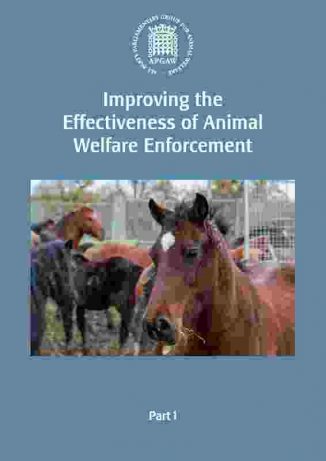
The Report highlights the lack of consistency of enforcement of Animal Welfare Law and summarises the key issues. It recommends that local authorities should have access to Dedicated Animal Welfare Officers to enforce Animal Welfare law, including the Animal Welfare (Licensing of Activities Involving Animals) England Regulations 2018. Training would be a requirement for the Animal Welfare Officers. Also the setting up of regional Animal Welfare Forums which include local authority Animal Welfare Officers, the RSPCA and Police. The establishment of a National Animal Welfare Board consisting of representatives from each regional Animal Welfare Forum, RSPCA, Police, DEFRA and relevant NGOs.
 We are so very sorry to share the news that Beebee has lost her battle with CM/SM [Syringomyelia] and MVD. Beebee was famous for her petite size and extraordinary appetite, she was also the face of the Cavaliers are Special Campaign.
We are so very sorry to share the news that Beebee has lost her battle with CM/SM [Syringomyelia] and MVD. Beebee was famous for her petite size and extraordinary appetite, she was also the face of the Cavaliers are Special Campaign.
This was started by a group of pet owners campaigning for a healthier future for their beloved Cavaliers, including the petition for mandatory health testing, as little was being done by the UK Kennel Club to encourage breeders to use the testing schemes available to them.
At its close, the petition held 70,088 signatories.
REST IN PEACE BEAUTIFUL BEEBEE
April 2012 – June 2022
 Written by owner Charlotte Mackaness
Written by owner Charlotte Mackaness
Beebee was born in a Jubilee year and died in one too – a true little Princess.
I can’t believe that my precious little one is gone forever and that I’ll never again see her pootling around the field with me on a “horse poo safari” or catch her opening a cupboard for an illicit snack.
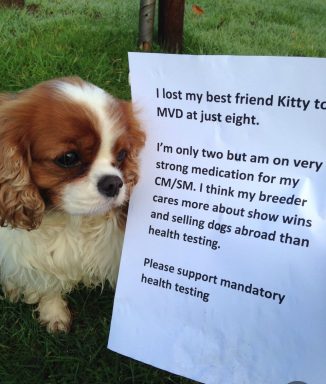 I feel so lucky to have had 10 years with her; more than we could ever have imagined after the devastating diagnosis of severe CM/SM at such a young age and the long list of health problems that followed. I suspect she never knew a normal life but was such a trooper and so good natured considering everything.
I feel so lucky to have had 10 years with her; more than we could ever have imagined after the devastating diagnosis of severe CM/SM at such a young age and the long list of health problems that followed. I suspect she never knew a normal life but was such a trooper and so good natured considering everything.
People were always drawn to her because she was the cutest little button but what a price she paid for it – a life of constant headaches and pain, although we did our very best to manage her symptoms.
It was most definitely her time and she left in an instant while munching on a chocolate digestive. As I left her for the last time, Beebee didn’t look like a 10 year-old-dog but one far older; her body ravaged by ill health. I truly hope something good came out of Beebee’s life: hopefully a few people became aware of Cavalier health issues and asked more questions about health tests before buying a Cavalier puppy.
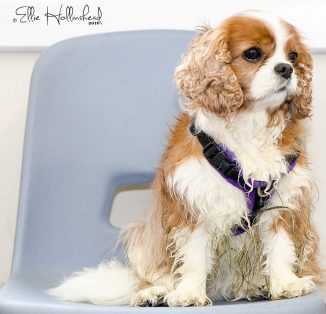 I’ve met some amazing people because of Beebee and for that I will be forever grateful. However, I’ve also seen the other side of Cavaliers: I feel deeply depressed that so little has been done to improve the outlook for the breed other than meaningless lip service, and that the foxes are well and truly in charge of the hen house.
I’ve met some amazing people because of Beebee and for that I will be forever grateful. However, I’ve also seen the other side of Cavaliers: I feel deeply depressed that so little has been done to improve the outlook for the breed other than meaningless lip service, and that the foxes are well and truly in charge of the hen house.
To those who bred her, she was Pascavale Nola. To us she was our little Beebee, Libby Libster – totally adored bundle of fluff, galloping gourmet and Queen of the house!
She will be greatly missed by the whole family.